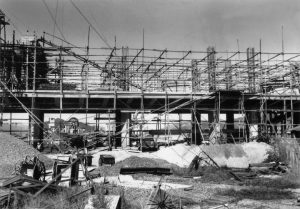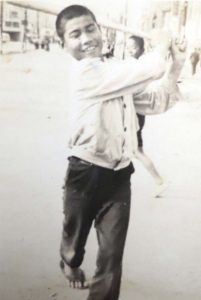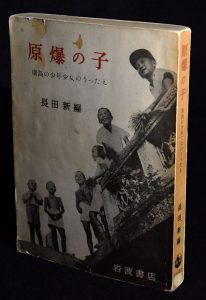Documenting Hiroshima 80 years after A-bombing: October 2, 1951, Children of the A-Bomb collection of A-bombing accounts published
Feb. 21, 2025
Inscribed with love for lost parents
by Minami Yamashita, Staff Writer
On October 2, 1951, a collection was published of personal accounts titled Genkaku no Ko, Hiroshima no Shonen Shojo no Uttae (in English, “Children of the A-Bomb: Testament of the Boys and Girls of Hiroshima”). The publication was edited by Arata Osada, then professor in Hiroshima University’s Faculty of Education who died in 1961 at the age of 75. In the preface, Mr. Osada wrote that he hoped to “consider what kind of impact the atomic bomb had on the human spirit” from the perspective of the children’s experiences and to use the information in peace education.
Mr. Osada collaborated with his students at the university to collect 1,175 personal accounts of children from schools in Hiroshima City and neighboring areas. The book contains 105 of the accounts, with parts from 84 quoted in the preface.
Spending three hours to finish own personal account
Junya Kojima, 85, a resident of Tokyo, was one of the students whose personal accounts in full were incorporated into the book. For a homework assignment when Mr. Kojima was a sixth-grade student at Senda Elementary School (in Hiroshima’s present-day Naka Ward), he picked up a pencil and wrote down his experiences. “I have been unhappy since my kind father and mother passed away,” he wrote. While concerned about the watchful eyes of his aunt, with whom he was living, he completed his account sitting at the kitchen table over a period of three hours.
Mr. Kojima was five years old at the time of the atomic bombing. He survived after experiencing the bombing at his home in the area of Senda-machi (in Hiroshima’s present-day Naka Ward), but his father, Masao Kojima, then 38 and an employee at the Hiroshima Communications Bureau, died the month after the bombing. His biological mother had already died from illness, and his stepmother left home after experiencing the bombing. His grandfather, Yoshio Kojima, died in the bombing. His grandmother, Isumi, survived the bombing, but died two years later, at the age of 58. He found himself alone and, with that, he was placed in the custody of his aunt and uncle when a third-grade student in elementary school.
Mr. Kojima said, “In today’s terms, they abused me.” He was beaten by his uncle and berated by his aunt with words denying his very existence. Even in winter, he would attend school in bare feet in Japanese geta sandals. His underwear always had holes. He would use pencils and erasers that he had found at school. Because it was hard for him to be at home, he would play outside with friends or walk around the neighborhood alone until the sun went down. “When I heard laughter from the homes of other families, I thought that when I grew up I wanted to have a family and sit down with everyone at dinner.”
Recalling his feeling at the time of the homework assignment involving the pers0nal acco0unt, he said, “That was a time I thought about dying every day.” However, that feeling abated whenever he remembered his deceased father. He wrote in his personal account, “With the thought that my father and mother are always looking at what I do, I try and do everything.”
Notice of publication undelivered
His account was carried in a magazine before the book collection was published. His homeroom teacher handed him the magazine, which he happily offered it to their Buddhist altar. In no time, however, it had disappeared. “My aunt and uncle probably didn’t like the expression of ‘unhappy’ I had used in the account.” With no notification of the collection’s publication reaching him, he first learned of the Children of the A-Bomb collection around 40 years later.
After he started attending junior high school, he helped out after school at the flower shop managed by his aunt, walking around selling flowers downtown until late at night. His only entertainment was listening to live radio broadcasts of games played by the Hiroshima Toyo Carp, a local professional baseball team founded in 1950. With the dream of becoming a professional baseball player, he devoted himself to playing on an amateur baseball team, but he had to borrow baseball equipment from a friend. He ultimately was unable to meet the recruitment criteria for tryout players.
Later, Mr. Kojima underwent training at a seal engraving shop and, at the age of 22, moved to Tokyo. When he was 31, he married. Nothing pleased him more than eating together around a dining table with his family of four. At his home, an expansive collection of jazz CDs is lined up in a row. “I have always hated the United States but, ironically, American culture gave me something to live for.”
From the vantage point of today, upon rereading his account, he burst into tears when recalling that time. Mr. Kojima concluded his account at the age of 11 with the words, “I want to see my mother and father just one more time, if possible, but I understand seeing them again is probably impossible.” He added, “I can’t wait to leave this world and meet up with my parents.”
The Children of the A-Bomb publication drew a strong reaction from the public soon after being released and was turned into a movie the following year, 1952. The collection became a perennial bestseller and has been translated into many languages, including English.
(Originally published on February 21, 2025)










